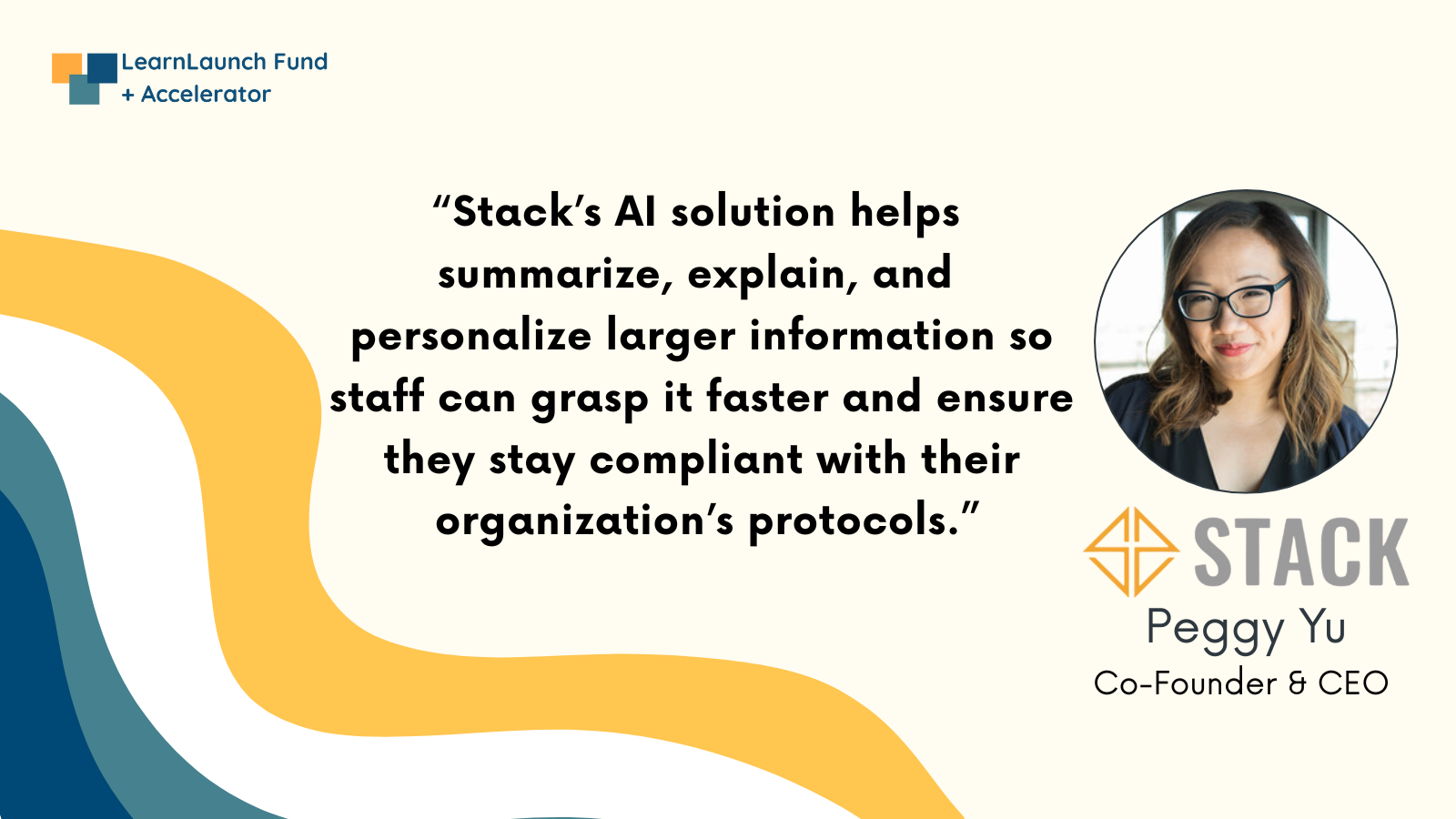Meet Stack: Pioneering the future of workforce development in clinical trials and research. With its AI-powered training and productivity tool tailored to each organization’s needs, Stack is transforming clinical research by accelerating the impact of professionals in some of the world’s largest and most elite medical centers.
Today, 16 partners, including Boston Children’s, Dana-Farber Cancer Institute, NYU Langone, Tufts Medicine, and Yale Medicine, trust Stack to enhance the effectiveness of clinical research by helping professionals build and apply critical skills. Its AI copilot creates customized chat tools for each partner, giving teams easy access to knowledge, documentation, and support specific to their institution.
Our conversation with Peggy Yu, Founder and CEO, offers deeper insight into how Stack is helping clinical teams learn faster, work smarter, and achieve more.
What gap did you see in the market that inspired you to create Stack?
Peggy: Clinical trials often move slowly and require a lot of effort, planning, and funding to get right. The unsung heroes are professionals who make the clinical trials happen. The industry focuses, rightly so, on patient accrual, and yet not enough attention is given to workforce enablement, which very much impacts recruitment and retention. This workforce that supports and drives these trials remains undertrained and under-supported, and they’re tired! There is a gap in timely, effective tools and training for these professionals, representing a missed opportunity to boost efficiency and trial success.
Stack provides on-demand training that allows clinical staff to learn exactly what they need, when they need it. This improves adaptability and reduces delays in the trial process. Our workforce-first approach ensures the entire trial ecosystem, not just patients, benefits from smarter and more inclusive solutions. Today, we are proudly serving 16 academic medical centers across the East Coast and Midwest. We can’t wait to scale our geographic footprint.
How do you see AI reshaping clinical trials, from research to workforce training?
Peggy: Clinical trial teams often face dense, complex materials like protocols, Institutional Review Board regulatory documents, and SOPs. Stack offers AI-enabled tools that increase both speed and precision, allowing staff to perform their roles more efficiently and with fewer errors. For instance, our AI copilot supports frontline staff during trials, giving answers to complex questions in real time, which contributes to speeding up onboarding and reducing the burden on experienced professionals.
One of our clients shared how a junior member in her team used Stack’s AI tool to independently research questions he had. Normally, it would have taken two or three back-and-forth conversations between them to fully explain the issue. But instead, the junior team member used the tool to get a solid understanding, then came to her with a proposed solution, saying, “Here’s what I found using Stack. Does this look right to you?” This turned what would’ve been multiple coaching sessions into a single, more focused conversation.
Stack’s AI solution helps summarize, explain, and personalize larger information so staff can grasp it faster and ensure they stay compliant with their organization’s protocols. It also provides ongoing, searchable access to information, which solves the issue of traditional training being static and not meeting real-time problem-solving.
Do you have a customer success story that really shows what makes Stack unique?
Peggy: During one of our customer’s interview calls, the Vice President and Director of Quality & Education at Yale Cancer Center, who also served as the immediate Past President of the Society of Clinical Research Associates (SOCRA), shared powerful insights into how Stack Education is helping transform the clinical research workforce.
Their team is deeply committed to continuing the critical mission of delivering life-saving medical solutions. However, one major challenge they faced was how to effectively scale training for their staff while keeping costs manageable. For instance, sending employees to conferences like those hosted by the Association of American Cancer Institutes was both expensive and logistically difficult, especially when trying to reach a large, diverse workforce spread across departments and institutions.
Through our AI-powered training platform, they were able to store their key documents in the AI tool where staff could quickly access needed information. This helps them scale workforce development efficiently while significantly reducing the financial and time burdens associated with travel and in-person events. Stack offered their team immediate access to learning, personalized support, and regulatory knowledge that was previously only accessible through time-consuming external resources.
What upcoming milestones are you most excited about as you scale Stack?
Peggy: I’m really excited about expanding Stack’s reach. While academic medical centers host most clinical trials, underrepresented patient populations don’t always have easy access to them. We’re working to bring our service and AI tool to community-based sites and clinical settings serving more far-flung patient populations, so that more people, both workers and patients, can be included in the clinical research ecosystem.
We are also looking forward to scaling geographically. We have a strong footprint on the East Coast and in some parts of the Midwest, but we’re just getting started. I can’t wait to bring Stack to the rest of the US and overseas, and to think even more boldly about who else can benefit from what we’re building.
Learn more at Stack’s website here.








































































